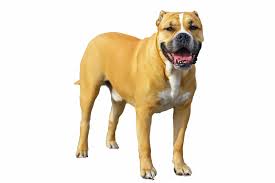
Ca de Bou
Conditions of detention
Ca de Bou dogs are adaptable and can live comfortably in both rural and urban environments, provided they get enough exercise. They thrive in homes with access to a yard or outdoor space where they can run and play.
Useful Fact: Despite their muscular build, Ca de Bou dogs are known to be quite relaxed indoors and can adapt to apartment living if given sufficient exercise.
Nutrition and diet
Ca de Bou dogs need a balanced diet rich in high-quality proteins and fats to support their muscular build. Both commercial dog food and carefully planned homemade diets can meet their nutritional needs.
Useful Fact: Feeding them twice a day can help maintain their energy levels and prevent digestive issues.
Health
Ca de Bou dogs are generally healthy but can be prone to certain genetic conditions such as hip dysplasia and elbow dysplasia. Regular veterinary check-ups are essential to maintain their health.
Useful Fact: Ensuring they maintain a healthy weight and receive regular exercise can help prevent joint issues and other health problems.
Grooming and care
The Ca de Bou has a short, dense coat that requires minimal grooming. Regular brushing will help keep their coat healthy and reduce shedding.
Useful Fact: Regular checks for ticks and fleas, especially after outdoor activities, are important to keep their skin healthy and parasite-free.
Education and training
Ca de Bou dogs are intelligent and eager to please but can be somewhat stubborn. Consistent, positive reinforcement training methods work best.
Useful Fact: Early socialization and obedience training are crucial to prevent aggressive behavior and ensure they grow into well-mannered adults.
Toys and entertainment
Ca de Bou dogs enjoy toys that provide mental and physical stimulation. Durable chew toys, fetch toys, and interactive toys are ideal.
Useful Fact: Given their powerful jaws, it’s important to select robust toys that can withstand heavy chewing.
Safety
Ca de Bou dogs should be supervised around young children and other pets due to their strong protective instincts. Secure fencing and leashes are essential for their safety.
Useful Fact: Proper training and socialization can help mitigate any aggressive tendencies and ensure they interact safely with others.
Accessories
Essential accessories for Ca de Bou dogs include sturdy collars and leashes, a comfortable bed, food and water bowls, and grooming tools.
Useful Fact: A harness can provide better control during walks and reduce strain on their necks, especially for such a strong breed.
Socialization
Early and ongoing socialization with different people, animals, and environments is vital for Ca de Bou dogs. This helps them become well-adjusted and confident.
Useful Fact: Regular exposure to various stimuli can prevent fearfulness and ensure they are comfortable in different situations.
Travel and Transportation
Ca de Bou dogs can travel well if accustomed to it from a young age. Secure them in a crate or with a dog seatbelt for car travel to ensure safety.
Useful Fact: Planning for their comfort and safety during travel, including providing breaks for exercise and bathroom needs, is important.
Behavior and psychology
Ca de Bou dogs are known for their loyal, protective, and courageous nature. They form strong bonds with their families and can be very affectionate.
Useful Fact: Understanding their protective instincts and providing proper training can help manage their natural guarding behavior.
Legal aspects
In some regions, there may be breed-specific legislation affecting Ca de Bou dogs. It’s important to be aware of local laws and regulations regarding their ownership.
Useful Fact: Compliance with local breed-specific laws ensures that Ca de Bou owners avoid legal issues and maintain responsible ownership.


